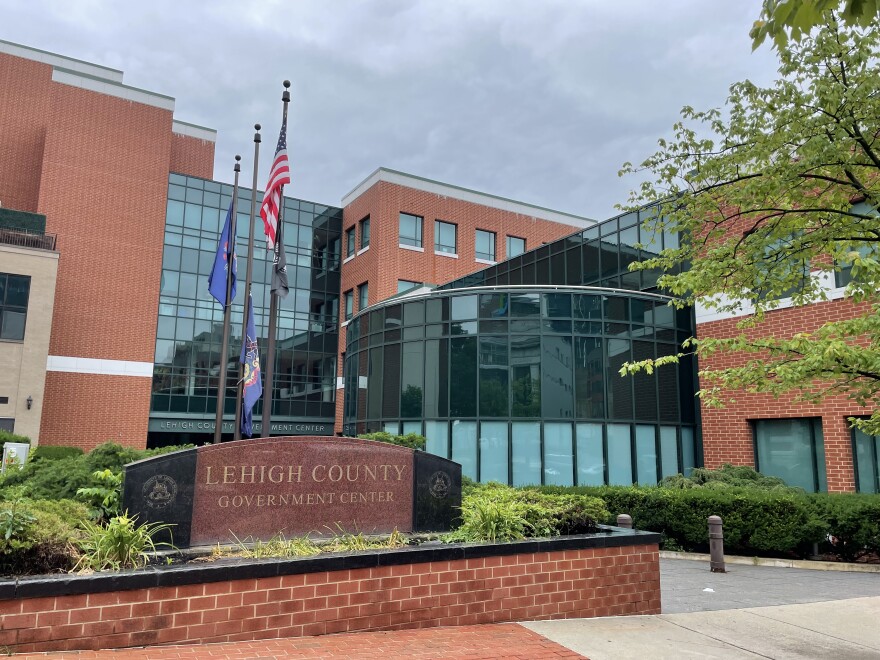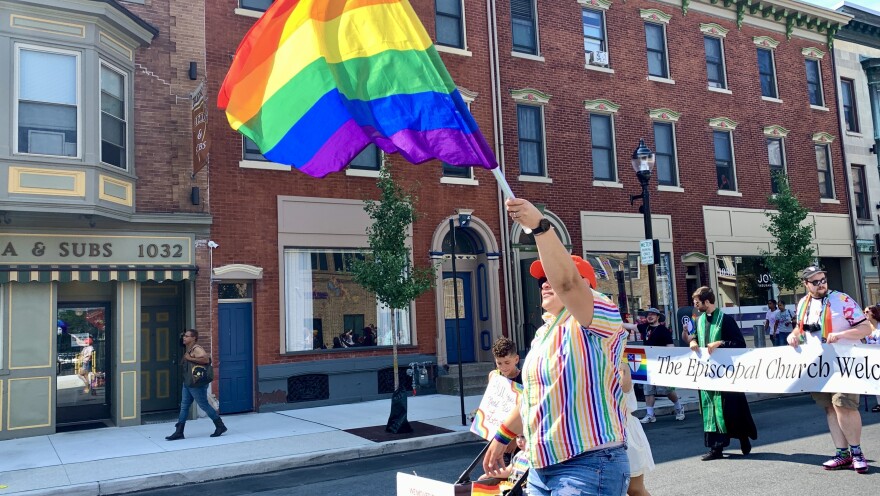ALLENTOWN, Pa. — After delaying action in December on a law that would establish non-discrimination law in Lehigh County, county commissioners on Wednesday saw dueling rewrites of the bill.
Both new versions of the proposed law, which would deal with discrimination in education, employment, healthcare, housing and public accommodations, would establish a set of protected classes beyond state law — but differ in their scope.
As with the prior bill, both establish a new human relations commission to adjudicate decisions related to discrimination cases brought to the county.
But one would defer certain authority to the state.
The original bill was put on hold after conflicting amendments introduced by multiple commissioners came before the board from commissioners and county administration.
The legislation was the result of efforts by the county's Human Relations Advisory Council, which was formed in 2021 to address issues of discrimination as it might occur in the county.
The board consisted of 11 community members and Commissioner Zach Cole-Borghi, with activists Guillermo Lopez and Liz Bradbury as chairpersons.
A rewrite led by original sponsor Cole-Borghi tries to incorporate proposed amendments, such as one made by county administration, while maintaining a wide set of protections.
The other rewrite, by Commissioner Jeffrey Dutt, cedes some investigation responsibility to the state and takes on a much more limited number of protected classes.
Both proposed bills, discussed in the governance committee and later by the full board on Wednesday, will again come before commissions on Feb. 14.
The board did, however, pass a resolution, put forward by commissioner Dutt, declaring it the public policy of Lehigh County to "eradicate discrimination in all forms."
Such a resolution is not biding like an ordinance, but states the board's intentions.
Both bills continue to have a provision for the cities of Allentown and Bethlehem to choose to opt in or out of the expanded county protections.
Cole-Borghi bill gets more support
The first rewrite, done by Cole-Borghi, now joined in sponsorship by Commissioner John Irons, covers, as did the initial bill, a wide range of new protected classes for the county.
They include actual or perceived race, ethnicity, color, religion, creed, national origin or citizenship status, ancestry, sex (including pregnancy, childbirth and related medical conditions), gender identity, gender expression, sexual orientation, genetic information, marital status and familial status.
It also covers discrimination related to GED rather than high school diploma, physical or mental disability, relationship or association with a disabled person, source of income, age, height, weight, veteran status, use of guide or support animals and/or mechanical aids, or domestic or sexual violence victim status.
Under it, complaints can be filed at the Lehigh County Office of Human Relations or online on a commission website, and must be made within 180 days of the most recent alleged act of discrimination.
The office then would have 10 days to convey complaints to the human relations complaint investigator and chairperson of the commission.
Within 30 days of receiving a complaint, the commission would review to determine if the complaint exemplifies a case of discrimination.
Respondents to the complaint would file an answer to the commission within 60 days.
"Pennsylvania law leaves people who may not expect to be open to discrimination, more exposed to it than they realize. And this attempts to say in Lehigh County, we're going to take those extra steps."Commissioner Geoff Brace
The new bill emphasizes that it is not made to violate any municipal, federal or state policy. It also changed immigration status to citizenship status.
It would appoint someone from the county's department of community and economic development as the human relations investigator.
Cole-Borghi said it also would remove the potential for offenders to face imprisonment, and that the county no longer assesses fines imposed, ceding that responsibility to courts.
Commissioner Sheila Alvarado also joined as a sponsor of the bill while commissioner Irons said he liked that it was more about resolution and restoration than being purely punitive.
Dutt takes a restrained approach
Commissioner Jeffrey Dutt's opposing bill covers an abridged selection of protected classes, including race, color, religion, sex, national origin, age, sexual orientation, gender identity or expression or disability.
Dutt's bill was not recommended by the committee, made up of commissioners Cole-Borghi, Dutt, Riddick, Alvarado and Irons, but still moved on to full board discussion.
"What I wanted to do was come up with something that would be bipartisan when it comes to this." Dutt said.
It states a similar procedure for adjudicating complaints with the human relations commission, but proposes linking the state's human relations commission as some other municipalities have.
It notes the workload and that through the county, there would be a $500 limit on fines assessed by the courts, whereas the state has an unlimited amount.
Dutt said that if the state does not cover a specific protected class, the investigation would revert back to the county.
He also noted the experience of state staff in handling discrimination cases, but that information still would be handled by the local DCED and Human Relations Commission.

Dutt also said other Human Relations Commissions throughout the state have had difficult times keeping a quorum, and argues for a seven-member board over the proposed 13-member board in Cole-Borghi's bill.
"I do appreciate your work to do something in a bipartisan way," Cole-Borghi said. "I think the only reason why I am not in support of yours and in support of mine ... is it really limits the protected classes in your ordinance compared to mine, whereas I want to encompass all the different protected classes that we have in there.
"I look at the other counties that have had members on their boards where they're having trouble doing it and their minutes are so short, as a kind a testament to the ordinance.
"It's stopping organizations from discriminating, which is lessening the workload for the commission."
Debate over scope
In Pennsylvania, laws such as the Pennsylvania Human Relations Act and Pennsylvania Fair Educational Opportunities Act prohibit discrimination based on race, color, religious creed, ancestry, age (40 and over), sex, national origin, familial status (only in housing), handicap or disability and the use, handling, or training of support or guide animals for disability.
Discrimination on the basis of sexual orientation and gender identity is not explicitly banned in the state, but Gov. Josh Shapiro has called to expand non-discrimination laws to protect LGBTQ+ Pennsylvanians statewide.
Such a bill also was passed in the state House of Representatives in May before being referred to the Republican-controlled Senate, where it has not yet been considered.

Pennsylvania currently has formal nondiscrimination protections for LGBTQ people via a regulatory change enacted under then-Gov. Tom Wolf in 2022, but legislative codification has not been enacted.
Commissioner Geoff Brace said the number of people on the board does not concern him, given the enthusiasm to participate the county found in the initial Lehigh County Human Relations Advisory Council.
He thanked Dutt's inclusion of some classes not covered by state law, such as LGBTQ individuals.
"My editorial comment is to shame that state non-discrimination laws don't cover some of the folks that we seek to, to cover in here," Brace said.
"Pennsylvania law leaves people who may not expect to be open to discrimination, more exposed to it than they realize. And this attempts to say in Lehigh County, we're going to take those extra steps."
Brace said he overall supported Cole-Borghi's legislation over Dutt's, for reasons such as not to leave the fine limit unchecked and deferring to the state, preferring the county to have a stated fine policy, and its coverage of a greater number of protected classes.
He said he would be open to efforts of a compromise option when it comes before the full board in a couple of weeks.
Commissioner Ron Beitler said he still had concerns about rights of the accused in the legislation, and he and Commissioner Brace agreed for the need for a default public statement made by officials that emphasized presumed innocence until proven guilty.

Beitler asked why they needed to specify protected classes as opposed to having a blanket law against non-discrimination.
He said doing so is important work, but mused about the discriminatory practices that they are not currently thinking of that are or will be equally as important.
"Why can't discrimination just be discrimination based on whatever factors, motivation? It's wrong in any and all cases across the board?" Beitler said.
"Because it seems to me like you're setting up a process where you're never stopping, adding to an endless list of definitions as you're trying to parse this down to specific things.
"So wouldn't it be more proactive to have an ordinance that protects everyone equally, regardless of group affiliation, or whatever affiliation or whatever specific characteristic?"
Commissioner John Irons responded by saying that it is responsive to those groups actively expressing and experiencing the pain of discrimination.
Others expressed that labeling the classes as such creates a sensitivity to that form of discrimination as something that exists and should be responded to, rather than something that can be pushed back on as not being present.
"It's a reminder that we function in a political system in which we seek 'Thou shalt not' statements and policies, rather than 'Thou shall' expectations," Brace said.
"And you know, that's an ethos that kind of gets to the core of our society."


